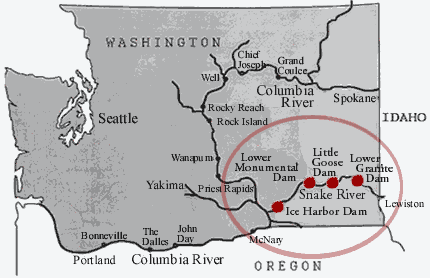forum
library
tutorial
contact

Dam Debate Obscures
Other Ways to Help Fish
by Editorial Board
Spokesman-Review, April 28, 2012
|
the film forum library tutorial contact |

|
Dam Debate Obscures
by Editorial Board
|
 Judge James Redden is off the case, but still on the nerves of those who support keeping dams on the lower Snake River intact.
Judge James Redden is off the case, but still on the nerves of those who support keeping dams on the lower Snake River intact.
Redden, who sits on the U.S. District Court bench in Portland, has presided over litigation filed by environmental, tribal and fisheries groups against federal government plans to protect endangered runs of fish in the Columbia River System. He said this week he thinks four Snake dams - Ice Harbor, Lower Monument, Little Goose and Lower Granite - should be removed. His statement was embraced by fish conservationists and attacked by those who believe the dams provide substantial economic benefits to the Northwest: electric power, flood control, irrigation and navigation among them.
Also, the dams have been modernized, and their operations modified, to reduce mortality among incoming, mature salmon and steelhead and outgoing smolts. The record or near-record runs of fish in recent years are the result of those efforts, as well as fish-friendly conditions in the Pacific Ocean.
In part, the improvements are also the result of Redden rulings going back more than a decade. He has repeatedly ruled that measures proposed by the National Oceanographic and Atmospheric Administration have not gone far enough to protect fish. Last August, he faulted the plan, called the biological opinion, or BiOp, for a third time.
But in November the 83-year-old judge removed himself from the case, although he remains on the bench.
Having stepped aside, Redden is free to express his opinion on the dams unconstrained by the potential for prejudicing the BiOp litigation. His words to an Idaho Public Television interviewer were plain: "I think we need to take those dams down."
All the usual suspects pounced: Save Our Wild Salmon; Northwest River Partners, which represents river users; and U.S. Rep. Doc Hastings, the Pasco native who chairs the House Natural Resources Committee.
Redden's words may no longer have legal weight, but as the regional jurist most knowledgeable about fish issues, he certainly has stature in the court of public opinion. There are counterweights.
Knowingly or not, Northwest utility ratepayers have paid an immense bill for fish recovery efforts. The Bonneville Power Administration has estimated that subtracting the 3,000 megawatts of generating capacity at the Snake River dams could add as much as $500 million to the region's annual power costs. And a decade-old Corps of Engineers estimate pegs the cost of breaching the dams at $1 billion.
Long before the region reaches that point, the results of recent breachings on the White Salmon and Elwha rivers in Washington should be studied. Dams on those streams completely blocked fish. So do others on the Klamath River in Oregon that are also candidates for demolition.
The Northwest is gradually walking back decisions made in prior decades that spurned fish in favor of irrigation and power. There are many more steps that could be taken that would reopen many miles of river before the region follows Redden's advice on the Snake dams.
learn more on topics covered in the film
see the video
read the script
learn the songs
discussion forum
